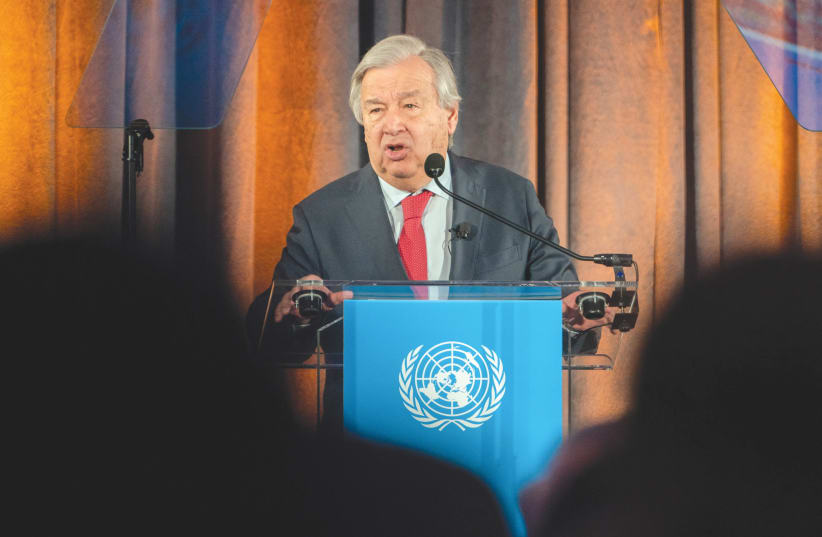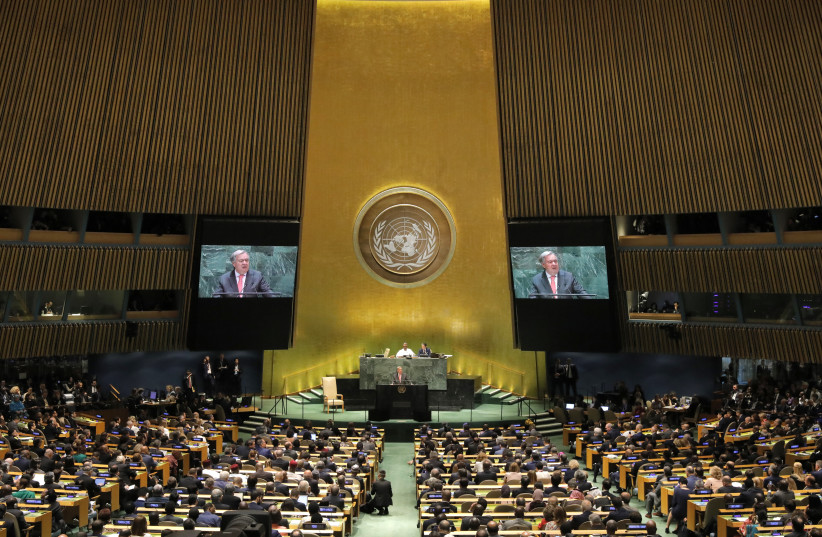The decades-long cold war waged through and by the United Nations against Israel is now a hot war – a direct conflict with major strategic implications. In addition to the cover provided by UNRWA to Hamas and other terror groups, and the continuous demonizing propaganda from the various UN agencies and their Human Rights Council, UN leaders have joined their NGO allies in a campaign to prevent Israel from obtaining the weapons needed to defend its citizens against another atrocity.In particular, in June 2024, when, based on clearly manipulated “evidence,” Secretary-General Guterres cynically added the IDF to the blacklist in the context of the UN’s framework on “Children and Armed Conflict” (CAAC).
The question for Israel is how to respond and effectively counter the UN involvement in this form of deadly political warfare.
During the decades in which the UN waged a gradually increasing cold war against Israel, which can be dated to the notorious 1975 UN General Assembly Resolution labeling Zionism as racism, Israeli responses have been ambivalent.
On the one hand, Israel has rejected and vigorously protested against the UN’s political attacks – then-president Chaim Herzog set the tone in 1975 when he demonstrably ripped up a copy of the resolution on the podium of the General Assembly. But at the same time, Israel has continued to attend and participate in the activities of UN committees and agencies and to cooperate with and host hundreds of UN officials, indirectly adding to their legitimacy.
Policymakers concluded that it was better to be inside, where they could highlight the falsehoods and absurdities, rather than sitting outside, unable to respond.
In 2001, Israeli delegates joined their American counterparts in walking out of the diplomatic forum at the infamous antisemitic Durban conference under the auspices of the UN Commission of Human Rights, led by Mary Robinson – but did not boycott other of the commission’s activities.
Similarly, in 2009, when the renamed but otherwise unchanged Human Rights Council created a hopelessly biased commission led by Judge Richard Goldstone to “investigate” the first Gaza war, Israel refused to cooperate. Later, when Goldstone admitted that his report, largely written by and based on the NGO network that is closely allied with the UNHRC, was a work of fiction, the policy of non-cooperation was vindicated. Goldstone’s report and recommendations disappeared from the agenda, until the next war.
Now, with the onslaught of direct attacks from UN officials, including repeated blood libels, laundering of Hamas “health ministry” claims on civilian casualties and “starvation,” and various forms of ingrained antisemitism, this ambivalence is insufficient. To impact and curtail the UN’s hot warfare, Israel must hit back effectively.
Why Israel should preventing entry to UN officials
One important policy tool is to immediately prevent the entry of all UN officials into Israel – meaning no new visas – and order the departure of officials already in the country.
This approach has been implemented on a limited scale – the visa of the head of the UN’s Office for the Coordination of Humanitarian Affairs (OCHA) was not renewed and she left. However, her replacement – a Dutch politician with a history of hostility towards Israel – was admitted.
In addition, officials from the UN Human Rights Council were barred from entering after they led a series of blatantly biased “investigations” for the reports of the special rapporteur for Palestine.
With the hot war that fuels the waves of antisemitic attacks worldwide and the attempts to impose sanctions coming from Secretary General Guterres, the time has come for a total ban on all UN personnel seeking to enter Israel and the areas under Israeli control.
This will not change the UN’s automatic majority led by the 56-nation Islamic voting bloc and their allies, or end their control over appointments, budgets, and committees. It will also not lead to the dismantling of UNRWA, the removal of hate-filled antisemitic special rapporteurs, or the end of bogus “investigations.”
But for UN officials, a blanket prohibition from entering Israel poses a significant cost and creates a dangerous precedent. If for their own reasons, other countries follow by barring officials from specific agencies, the image (or myth) of an authoritative global framework encompassing all countries will be brought into question and begin to disintegrate.
UN agencies that operate from inside Israel (or in Gaza, which is now under IDF control) would be incapacitated and, as a result, could lose their large budgets, resulting in major staff reductions.
A clear Israeli policy move would also gain support from UN-skeptics in the US and some other countries and could lead to budget cuts and other actions to curtail the organization and its influence.
Although prohibiting the entry of all UN personnel until the policy changes fundamentally is a limited action, it sends an important message highlighting the absence of legitimacy. Given the stakes in this hot war being waged by the UN against Israel, the failure to take strong action could be very costly.
The writer is professor emeritus of politics at Bar-Ilan University and president of the NGO Monitor research institute in Jerusalem.

